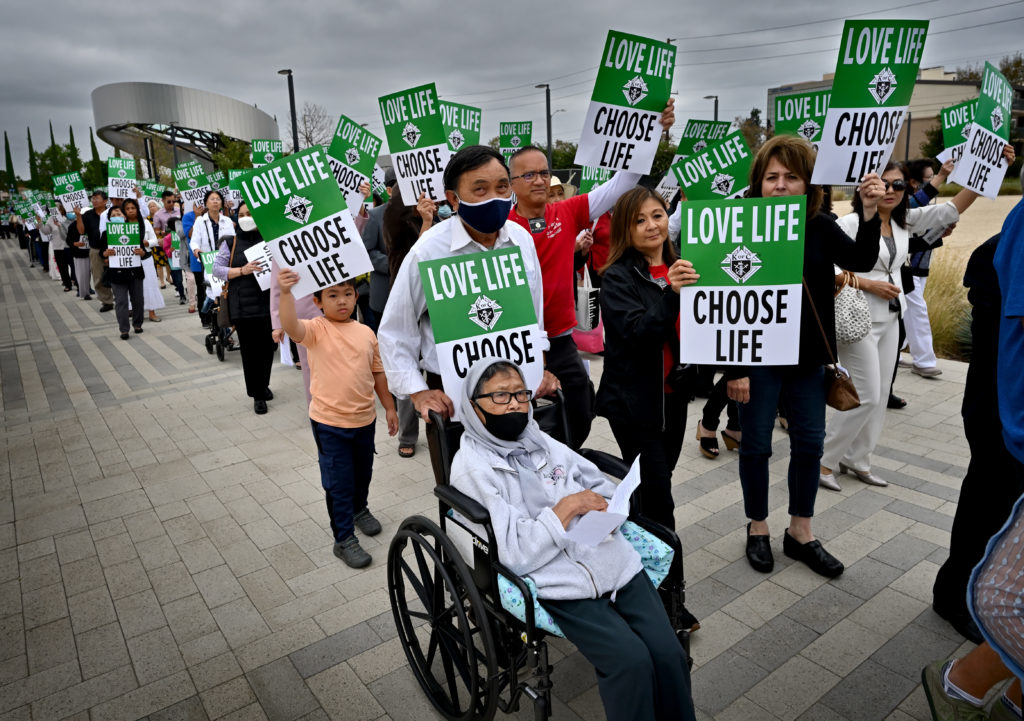One of the central messages of Pope Francis’ visit to the United States in 2015 was an invitation to resist polarization between two simplistic political or ideological camps of “good” vs. “evil” guys. In other words, the righteous vs. the sinners.
The problem he described was on full display during the Holy Father’s address to a joint session of Congress, where he got rousing cheers from Republicans when he insisted that life be defended at all stages, and the same from Democrats when he firmly denounced the death penalty.
As the years of his pontificate have gone by, Francis has emphasized anti-polarization regularly — especially when addressing our U.S. context. “Polarization is not Catholic,” he said in response to our particular situation. Instead of adopting the secular spirit of the age, we must instead be about the great “both/and” of our tradition.
Unfortunately, it seems we haven’t paid much heed to the pope’s advice lately. Nearly everything seems viewed through a fight-to-death, good vs. evil, antagonistic binary. Indeed, it’s easier to classify Americans by the ideas and people they despise, than by those they support and love.
More and more, “nearly everything” includes sex and gender as a central matter of polarized difference. When asked whether being a man or a woman is something that is permanent and cannot be changed, 90% of Republicans agreed, compared with only 36% of Democrats.
This attitude has infected the Church, even on matters that seem to be settled cases. My column last month made what I thought was the uncontroversial point that vicious mocking of Catholic nuns and even Christ himself made the “Sisters” of Perpetual Indulgence a hate group, but even America magazine — normally a source of anti-polarization — foregrounded the views of one Catholic Sister of the Holy Names who says she finds them to be “kindred spirits”!
If we cannot even agree that a group which hosts annual “peep shows” at Easter, mocking Christ on the cross as a stripper, is anything but a Catholic kindred spirit, boy, the polarization runs deep.
Into this mess enters the California Catholic Conference, which for many years now has been tasked with navigating a political and cultural scene that is openly hostile on many fronts.
The group, which serves as the public policy arm for the Golden State’s Catholic bishops, recently brought me to Sacramento to help run a workshop retreat exploring best practices based in part on my book “One Church” (Ave Maria Press, $17.23).
I was impressed by the group of people that showed up: diocesan leaders in the fields of communications, Hispanic ministry, Catholic schools, Respect Life and Family Life ministry, religious education and catechetical formation, and legislative advocacy, among others.
There was a palpable unity-in-diversity at the retreat, something like the opposite of polarization. There was racial and ethnic diversity, real political and ideological diversity, and notable ecclesial and theological diversity. But all were very clearly united in a common commitment to the Gospel. There was no idolatry of secular politics to be found.
I guess this shouldn’t surprise me. When it comes to anti-polarization, Catholics in California have been leading the way for some time now, particularly as dioceses there combined their “conservative” pro-life activism with their “progressive” social justice activism into one Gospel-centered office focusing on a consistent vision of human dignity. The name Archbishop José H. Gomez gave to the office in Los Angeles, for instance, is “Life, Justice, and Peace.”
The leadership of Kathleen Buckley Domingo, the dynamic and creative executive director of the whole conference, cannot be overstated either. Under her leadership, it was clear after this event that California dioceses — despite the significant challenges, again, they face in their state — are poised to reach new heights of anti-polarization, anti-idolatry in service of the Gospel.
As the action plans of the dioceses toward this goal were conceived and articulated, frankly, I couldn’t help but tear up a bit. It is clear that these centers of Catholicism in California want to marshal their resources to be field hospitals for hurting people all over the state.
Among the many great ideas, for instance, was a proposal to pick up on the Holy Father’s call for intergenerational solidarity by creating an institution for young Catholics to serve elderly Catholics and vice versa. This beautiful witness will serve two of the most disconnected and lonely groups of people through a culture of encounter, an effective antidote to our polarized throwaway culture.
As I left the event, I began thinking about how I could feel so very positive about the Church in a state and culture that, again, is so hostile in so many ways. I came to the conclusion that this authentic Catholicism is growing not despite the hostility, but because of it.
Iron sharpens iron. Amid all the difficulties, California Catholics have developed commitments to the Gospel of Christ that are thick and tough. Their hands have developed callouses from the hard and pressurized work required of them. But they prove that the end result of this kind of persecution — as we know well from our Church’s history — need not end in cynicism, despair, and defeat. In California, mirroring the response of our ancestors, they are responding with energy, creativity, and above all, Christian love. I saw it with my own eyes and heard it with my own ears. And I cannot wait to see what the Holy Spirit will do with it.

